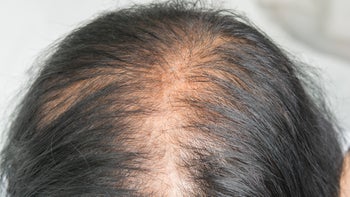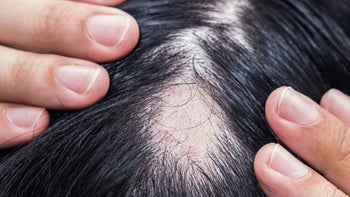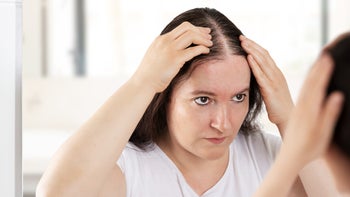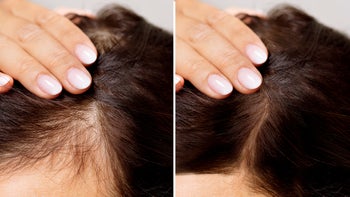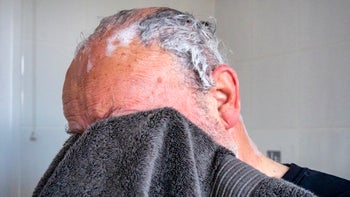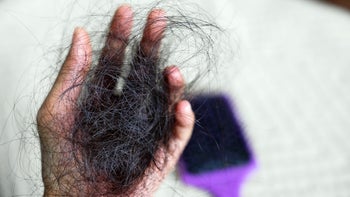
Can Oral Minoxidil Help Treat Hair Loss?
Key takeaways:
There are different ways to treat hair loss, including medications and surgery. Minoxidil foam and minoxidil topical solution are commonly recommended medications for hair loss.
Minoxidil also comes as an oral tablet, which is FDA approved to treat high blood pressure. But it’s sometimes prescribed off label at low doses for the treatment of hair loss.
Think of oral minoxidil for hair loss as a “use it or lose it” treatment. If you stop taking it, hair loss will likely resume over time. Talk to a healthcare professional to figure out the best hair-loss regimen for you.
Access savings on related medications
Table of contents
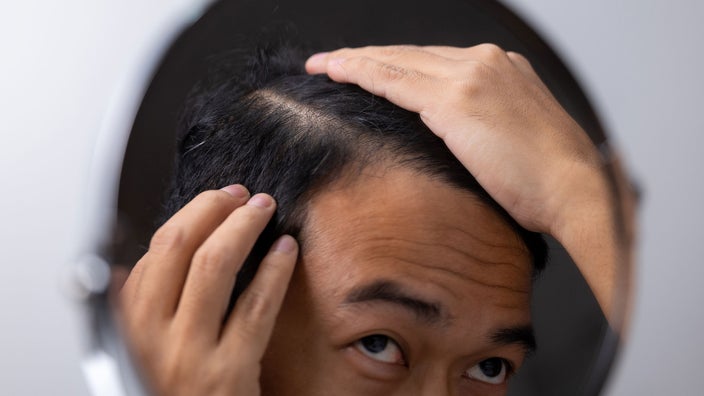
Androgenetic alopecia is the most common cause of hair loss in men and women. Also called male- or female-pattern hair loss, it’s especially common among men. But regardless of who it happens to, hair loss can be deeply distressing. The good news is that many treatments are available.
One medication, minoxidil, is a go-to treatment for many people searching for a convenient hair-loss remedy. Topical forms of minoxidil that are applied to the scalp are especially popular. An oral form of minoxidil is also available, and these tablets are occasionally used by people looking to start a new chapter on their hair loss journey.
Minoxidil overview
Topical minoxidil is a common treatment for hair loss. You can purchase it over the counter. It sometimes goes by the name Rogaine and comes in two main forms: a foam and topical solution. Both are applied directly to the scalp.
Search and compare options
Another form of the medication is oral minoxidil. It’s a prescription-only tablet that’s FDA approved to treat high blood pressure. But many healthcare professionals prescribe it off-label to treat hair loss.
How does minoxidil work?
Hair grows in a number of stages, including a growing phase and a resting phase. Minoxidil is thought to extend the length of the growing phase and shorten the duration of the resting phase.
There’s one caveat to this. An enzyme (protein) on the scalp — scalp sulfotransferase — has to change minoxidil into its active form. If you don’t have much of this enzyme, topical minoxidil may not turn into its active form. This is one reason why some people find it to be ineffective for hair loss.
When topical minoxidil fails, some healthcare professionals recommend turning to oral minoxidil.
How effective is oral minoxidil for hair loss?
Oral minoxidil appears to be a relatively effective and recommended option for regrowing hair. But there’s not much data available overall.
For instance, in one small study, an expert panel reported that 100% of study participants had some improvement in hair density around their crown area after about 3 to 6 months of use. Over 40% of these participants showed “excellent improvement.” Other studies have also found that oral minoxidil is an effective and well-tolerated alternative to topical minoxidil.
Minoxidil FAQs: Learn more about how long minoxidil takes to work for hair loss, plus what happens if you stop using it.
Can it affect your sex life? Certain hair-loss medications can affect your sex life. But is this the case for minoxidil? Here’s what the evidence says about potential sexual side effects.
Natural remedies for hair loss: Some people might be hesitant to try medications for hair loss. These natural remedies might help support hair health, but note that research is lacking.
We’re still learning about oral minoxidil’s effectiveness for hair loss.
Is oral minoxidil better than topical minoxidil for hair loss?
There aren’t many head-to-head studies looking at whether oral or topical minoxidil works better for hair loss. One small study found that oral and topical minoxidil are similarly effective for female-pattern hair loss.
One clear benefit of oral minoxidil is that it doesn’t cause side effects like scalp irritation, burning or redness. These are common side effects that some people may have with topical minoxidil. If you’re experiencing these symptoms while using topical minoxidil, talk to your healthcare professional. They may recommend trying oral minoxidil instead.
How is oral minoxidil dosed for hair loss?
Oral minoxidil is approved to treat high blood pressure. Since oral minoxidil is used off-label for hair loss, there’s not an officially established dose for this purpose. But healthcare professionals tend to prescribe low-dose oral minoxidil for hair loss.
According to a study published in the Journal of American Academy of Dermatology, an oral minoxidil dose between 0.5 mg to 5 mg per day can safely treat hair loss. This is much lower than the dose used to treat high blood pressure.
How does oral minoxidil compare to finasteride for hair loss?
Finasteride (Propecia) is a medication that’s approved to treat hair loss. It stops your body from converting testosterone into DHT, which is a hormone that can contribute to scalp hair loss. Because it works in a different way, some people take it in combination with topical or oral minoxidil.
When comparing the two head-to-head, finasteride was found to be more effective than oral minoxidil when given in a similar dose in a large meta analysis. It increased scalp hair count more than oral minoxidil.
What are the side effects of oral minoxidil?
Oral minoxidil is given at a lower dose for hair loss than for high blood pressure. At lower doses, you’re less likely to experience side effects. However, low-dose oral minoxidil still has some possible side effects to be aware of. These may include:
Hair growth in other areas of the body
Puffiness around the eyes
Fluid buildup
Lightheadedness
Increased heart rate
Headache
Lower blood pressure
Although rare, oral minoxidil can also cause serious side effects. There have been reports of serious heart-related events, primarily when given at higher doses. If you have a history of heart disease, oral minoxidil might not be right for you. If you experience sudden chest pain or shortness of breath, you should seek immediate medical attention.
Frequently asked questions
Minoxidil FAQs: Learn more about how long minoxidil takes to work for hair loss, plus what happens if you stop using it.
Can it affect your sex life? Certain hair-loss medications can affect your sex life. But is this the case for minoxidil? Here’s what the evidence says about potential sexual side effects.
Natural remedies for hair loss: Some people might be hesitant to try medications for hair loss. These natural remedies might help support hair health, but note that research is lacking.
The bottom line
Oral minoxidil is a prescription medication that’s FDA approved to treat high blood pressure, but it’s also used off-label for the treatment of hair loss. It’s an alternative option to topical minoxidil, and it’s been shown to help improve hair growth in several studies. If you’re interested in trying oral minoxidil for hair loss, make sure to speak to a healthcare professional.
Why trust our experts?



References
Akiska, Y. M., et al. (2024). Low-dose oral minoxidil initiation for patients with hair loss: An international modified delphi consensus statement. JAMA Dermatology.
Gupta, A. K., et al. (2022). Relative efficacy of minoxidil and the 5-α reductase inhibitors in androgenetic alopecia treatment of male patients a network meta-analysis. JAMA Dermatology.
Johnson & Johnson Consumer. (2022). Mens Rogaine minoxidil - unscented formula- minoxidil aerosol, foam' [package insert].
Organon. (2022). Propecia- finasteride tablet, film coated [package insert].
Pal, S., et al. (2022). Low-dose oral minoxidil deemed safe for hair growth. Physician’s Weekly.
Panchaprateep, R., et al. (2020). Efficacy and safety of oral minoxidil 5 mg once daily in the treatment of male patients with androgenetic alopecia: An open-label and global photographic assessment. Dermatology and Therapy.
Patel, P., et al. (2023). Minoxidil. StatPearls.
Ramos, P. M., et al. (2020). Minoxidil 1 mg oral versus minoxidil 5% topical solution for the treatment of female-pattern hair loss: A randomized clinical trial. Journal of the American Academy of Dermatology.
Randolph, M., et al. (2021). Oral minoxidil treatment for hair loss: A review of efficacy and safety. Journal of the American Academy of Dermatology.
Vañó-Galván, S., et al. (2021). Safety of low-dose oral minoxidil for hair loss: A multicenter study of 1404 patients. Journal of the American Academy of Dermatology.




